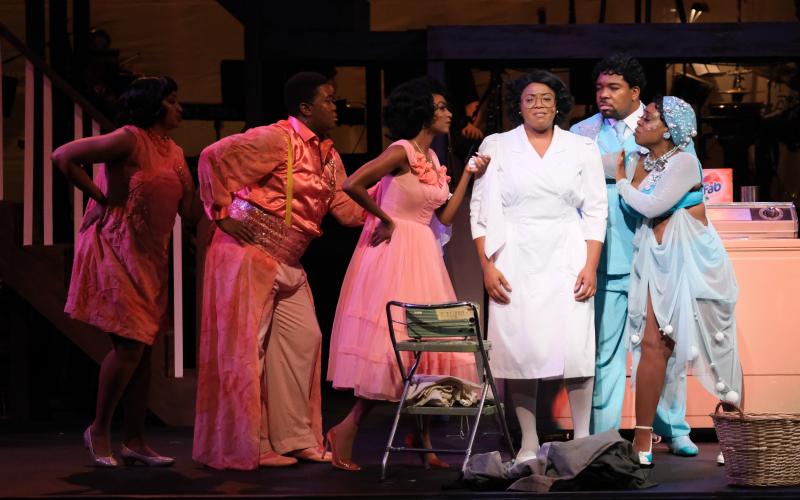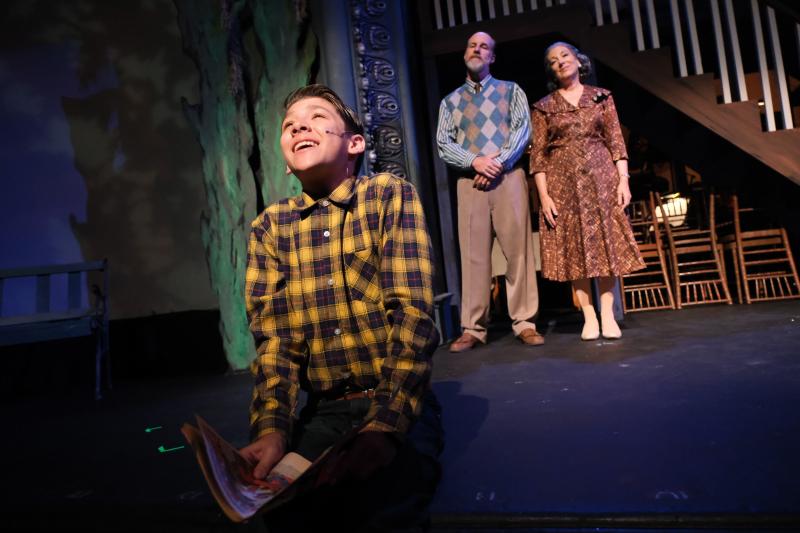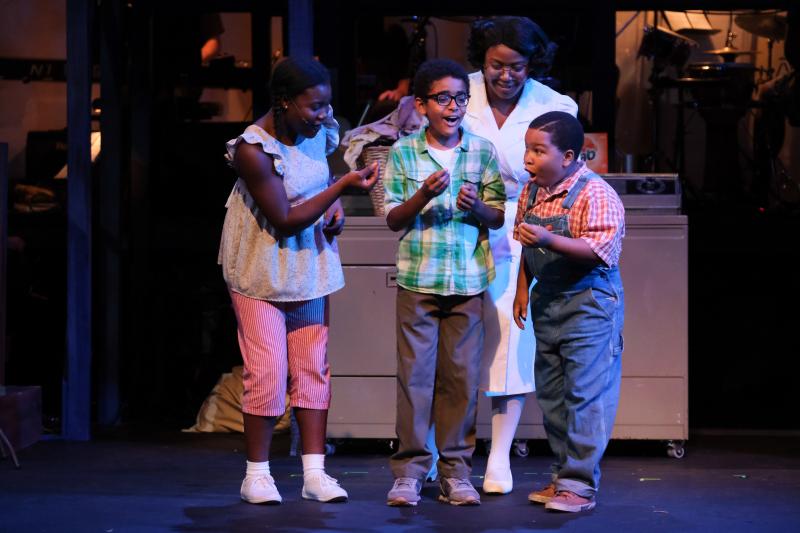Review: CAROLINE, OR CHANGE at Ray Of Light Theatre Thrills and Inspires

L to R (Elizabeth Jones, Cadarius Mayberry, Majesty Scott, Jasmyne Brice, Anthone Jackson & Leslie Ivy)
There is just something so damned exciting about Tony Kushner and Jeanine Tesori's "Caroline, or Change"! It is rare indeed to experience a work of art this ambitious, morally complex, entertaining, honest, and just plain downright human. It is easily one of the handful of best musicals written in the past 25 years. And how original - a musical play about nothing less than the human capacity for change and growth despite seemingly insurmountable odds. Though created back in 2003, this is yet another theatre piece that seems ripped from today's headlines. As Kushner himself has noted, he's been called "eerily prescient" so many times it should be his drag name(!). For anyone out there bemoaning the dumbing-down of the American musical theater and longing for the halcyon days of Broadway's supposed Golden Age, you need look no further than "Caroline" to restore your confidence.
"Caroline" hinges on an ingenious plot device wherein well-meaning people do the wrong things for the right reasons. Noah, an 8-year-old Jewish boy in 1963 Louisiana has lost his mother to lung cancer. He spends much of his day hanging out in his basement laundry room with Caroline, the family's taciturn 39-year-old "Negro" maid. He delights in the ritual of lighting her daily cigarette, likely the vestige of something he shared with his deceased mother. Noah also has the habit of carelessly leaving coins in his dirty laundry. His new stepmother, northerner Rose, finds this disrespectful to the low-paid Caroline, and so insists on a new practice. From this point on, Caroline is to keep any money that she finds in Noah's pockets. Rose believes this will teach Noah valuable lessons in respect for others and the value of a dollar, with the added benefit of providing Caroline with a much-needed supplement to her take-home pay. She, unfortunately, is blind to the humiliating position this puts Caroline in and how it shifts the power dynamics between Caroline and the family. Meanwhile, Noah comes to see himself as a sort of silent, great white benefactor to Caroline's own family, and even fancies himself one of them. As the practice continues and the amounts keep growing, Caroline's children enjoy the thrill of having a little spending money for the first time in their lives. Things reach the breaking point when Noah leaves his $20 Hanukkah money in his laundry.

This story plays out against the backdrop of the burgeoning civil rights movement, the JFK assassination, and a Confederate statue that has mysteriously disappeared in the night. (Like I said, 'eerily prescient.') Lest "Caroline" sound like a dry discourse on civil rights, let me assure you it is anything but. The cast of characters includes a spritely anthropomorphized Washing Machine, Dryer, Radio, Bus and Moon. (Yes, you read that correctly!) The score is wildly entertaining and varied, blending the sounds of classic R&B, pop, gospel, showtunes and traditional Jewish folk music.
It is a sign of the creators' integrity that none of the main characters is sanctified. Virtually all of them are flawed and at some point act questionably, or worse. Near the end, there is an exchange between Noah and Caroline when they are both pushed past the breaking point that is equal parts breath-taking and horrifying in its naked honesty and ugliness. That it occurs between a white, Jewish boy and his family's African-American, Christian female employee only makes its implications all the more complicated. Each one should know better, but in that moment each stoops to their lowest self with the sole purpose of hurting the other as deeply as possible. And yet - it leads to a tentative rapprochement that underscores the play's overriding theme of human beings' ability to change. It shows how we sometimes can get past the lowest of our lows, the worst parts of ourselves, to reach a place of understanding.
"Caroline, or Change" is the kind of multi-layered show that is exceedingly challenging to pull off. Ray of Light's production succeeds on a number of fronts, with some occasional shortcomings along the way. Given that much of the action takes place in a basement laundry room and the title character wears a maid's uniform for almost the entire show, the opportunities for the design team to provide beautiful stage images are understandably limited. Designer Kuo-Hao Lo's spare set uses the full width and height of the stage area to clearly delineate a wide variety of locations. It also allows scenes to seamlessly transition one into another, thus keeping the focus on the actors rather than on the scene changes. Costume designer Bethany Deal is largely confined to providing period streetwear, but even within that constraint shows nice attention to detail in Caroline's smart church suit. When she does get to let loose with the fanciful costumes for the anthropomorphized characters, Ms. Deal creates a surprisingly sexy and eye-catching look for The Washing Machine. Kevin Myrick's lighting is largely functional aside from a lovely, spectral backdrop for the character of the Moon.

Director Jenn BeVard has guided her cast to find the emotional core of their characters and to provide clarity in telling such a multi-faceted tale. While this is a show with a lot going on, where songs often morph one into another without applause breaks and multiple scenes take place simultaneously, it is never confusing to watch. BeVard's staging helps us track the various strands of the plot, and effectively maintains the forward momentum of the overall story.
The lead performances are strong, and I suspect they will only get deeper and richer as the run continues. Christopher Apy is terrific as 8-year-old Noah, whose emotional arc would be a challenge for an actor of any age. Apy shows stage skills and a transparency of emotion beyond his years, and there is nary a hint of the cute or cloying. The role of Caroline is another challenging one, given that she is completely devoid of the kind of sparkle and razzamatazz typically associated with a musical theater heroine. Jasmyne Brice's Caroline starts out with simmering resignation, then gradually builds to the show's galvanic 11 o'clock number, "Lot's Wife," where her character finally erupts to lay it all on the line. While Brice's acting is stronger than her singing, she delivers the goods where it counts in the devastating final moments of the show.
The key supporting performances are a bit variable. Katie Pimentel as stepmother Rose brings a welcome warmth and depth to a character who can too easily be played just for brittle comedy. Roy Eikleberry sings gloriously as Noah's still-grieving father, even if his stage demeanor reads more stiff than distant and hurting. Unfortunately, Markalia Dyson is vocally miscast as Caroline's daughter, Emmie. While Ms. Dyson has an effective chest belt, her two biggest numbers - frankly two of the most moving in the whole show - crest in her weak upper register, thus robbing them of their full power.
Special mention goes out to Leslie Ivy as the delightfully sexy Washing Machine, and Elizabeth Jones, Cadarious Mayberry and Majesty Scott as The Radio. This "girl group" trio has the most tuneful, Motown-esque music in the show, and they rise to the occasion with sharp harmonies and sinuous moves. In these days of expanded understanding of gender, it is heartening to see how beautifully Mr. Mayberry slides into a role originally conceived for a woman. It also deftly underscores the play's ultimate theme of the enduring human capacity for change and compassion. Despite the forces that prey on our fears to try to beat us down and separate us, we will never go back to the bad old days. As Emmie sings in the rousing epilog:
I'm the daughter of a maid, in her uniform, crisp and clean.
Nothing can ever make me afraid.
You can't hold on, you nightmare men, your time is past now on your way.
Get gone and never come again!
For change come fast and change come slow but everything changes.
Photos by Nick Otto
Ray of Light Theatre's production of "Caroline or Change" runs through Saturday, October 5th at the Victoria Theater, 2961 16th St., San Francisco, CA. Running time is 2 and ½ hours. Tickets and further information are available at https://rayoflighttheatre.com.
Videos
